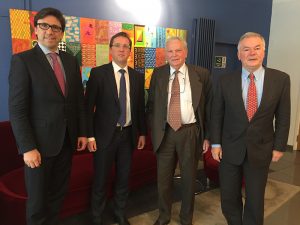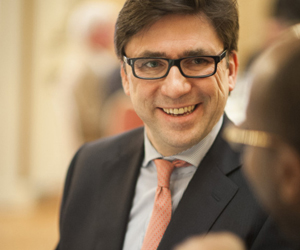
How to do business with the African Development Bank
Corporate and Institutional Procurement
Every year, the AfDB purchases approximately 40 million Euros, of goods, works and services for its internal requirements. Most of the Bank’s procurement is conducted by the Institutional Procurement and Logistic Division. In addition, other purchases may be made directly by the Field offices and Managers of various Cost Centers.
Depending on the Bank’s needs, the General Services and Procurment Department issues Requests for Proposals or Invitations for Bids. The vendor kiosk is dedicated for vendors interested in supplying goods, works and services for the Bank’s internal requirements.
Consulting opportunities are more open. AfDB staff often engages individual consultants or consulting firms directly, without borrower involvement, especially when they need particular specializations or the workload of permanent staff is heavy. For example, consultants are often hired to accompany AfDB staff or missions related to project preparation, review or appraisal.
Most such assignments are for individual consultants; consulting firms are rarely required, but when they are, the Bank follows its standard rules. The assignments for individuals are usually short-term and last for 5 to 10 weeks. The type of work varies widely, but can include activities such as:
- General and sectoral identification.
- Pre-investment studies;
- Preparation of terms of reference;
- Technical supervision;
- Problem project review and appraisals;
- Completion of reports; and
- Post-evaluation reports.
Bank staff hires consultants through procedures similar to those used by borrowers. It is up to the user unit (usually an Operations Division of the Bank), in cooperation with the Bank’s Procurement Unit, to develop a shortlist of consultants for the assignment. Selection is based on the user unit’s own experience and the Procurement Unit’s database of registered consultants. For this reasons, it is essential that consultants be registered on the AfDB DACON (http://dacon.afdb.org/dacon/), a database used by AfDB and AfDB borrowers to identify people or companies that may be suitable for consulting work on a AfDB project.
 Private Sector Lending
Private Sector Lending
The AfDB addresses private sector development (PSD) at two primary levels:
- Assist African governments to improve the enabling environment for the private sector by:
-> Improving essential physical infrastructure (e.g. power, information and communication technology, transportation)
-> Improving “soft infrastructure” (. e.g. regulatory and legal frameworks, financial sector, trade liberalisation) - Direct lending to the private sector for:
-> Infrastructure (e.g. power, transportation, telecoms, water)
-> Industries and services (e.g. mining, cement, agribusiness, hotels)
-> Financial Intermediation (e.g. banks, insurances, leasing)
Eligible are Public Sector Companies of AfDB and Blend countries without a sovereign guarantee and Private Sector Companies in all Regional Member Countries (RMCs). The Maturity is up to 15 years including a 5-year grace period. Interest rate is either fixed or floating. Currencies can be in EUR, USD, ZAR, JPY and any lending currency approved by the Bank. Upcoming additional hedging features are the opportunity to fix, unfix and re-fix the base rate as well as the ability to cap or collar all or part of the floating base interest rate and right to change the lending currency, including into local currency.
The mandate of the Private Sector Operations (PSO) unit is to ensure the Bank Group’s support to private sector development in RMCs, by means of financial and technical assistance to private sector-led projects and programs. Private sector approvals represent around 15% of the AfDB’s total approvals.
Business Approach
Before pursuing a contract financed by the AfDB, one should understand the division of responsibilities between the Bank and the borrowing country’s executing party. When the Bank lends funds to a developing country for a project, the project’s executing agency is usually a branch of the borrowing country’ government. While the AfDB and the executing agency share aspects of project preparation, it is the executing agency, not the AfDB, that is responsible for virtually every element of project execution, particularly the hiring of consultants and the procurement of goods and works.
However, although the borrowing country is a contractor’s primary client, Bank often approve shortlists of companies submitted by executing agencies for consulting works. Therefore, when meeting with Bank experts, a company should provide brief and specific information on its relevant experience. From a company’s point of view, a meeting with Bank officials should be viewed as an opportunity to obtain valuable project intelligence, as well as confirmation that a project might eventually require the company’s services.
Before any meeting at the AfDB, consult all the information available on the project involved. In particular, consider the questions outlined below:
Scope of the project
What will the project require in terms of goods, equipment and consulting services? The AfDB’s various information documents can provide initial information in this area, and should done reviewed before meeting Bank staff.
What level of expertise will be requiring, and in what sector(s)?
What portion of the Bank loan has been set aside for a task of specific interest to the company?
Timing of the project
When will the (pre-)feasibility studies be conducted for the project, and who will conduct them?
When will the project be appraised by Bank staff, and will the Bank require external assistance with this procedure?
When is the project proposal going to the Bank’s Board of Directors? Is this a priority for the Board?
If the project has been approved by the Bank, when will it come into force in the recipient country?
When will the required goods or services be contracted for implementing the project?
Identification and evaluation of project participants
Who are the AfDB Project Officer’s key contacts in the recipient country and its executing agency?
What other companies are involved in the project? Is there a strong local capability?
Are other countries contributing to financing the project’s preparation phase (co-financing)?
Is there any bilateral funding from Belgium (Finexpo) or other countries?



